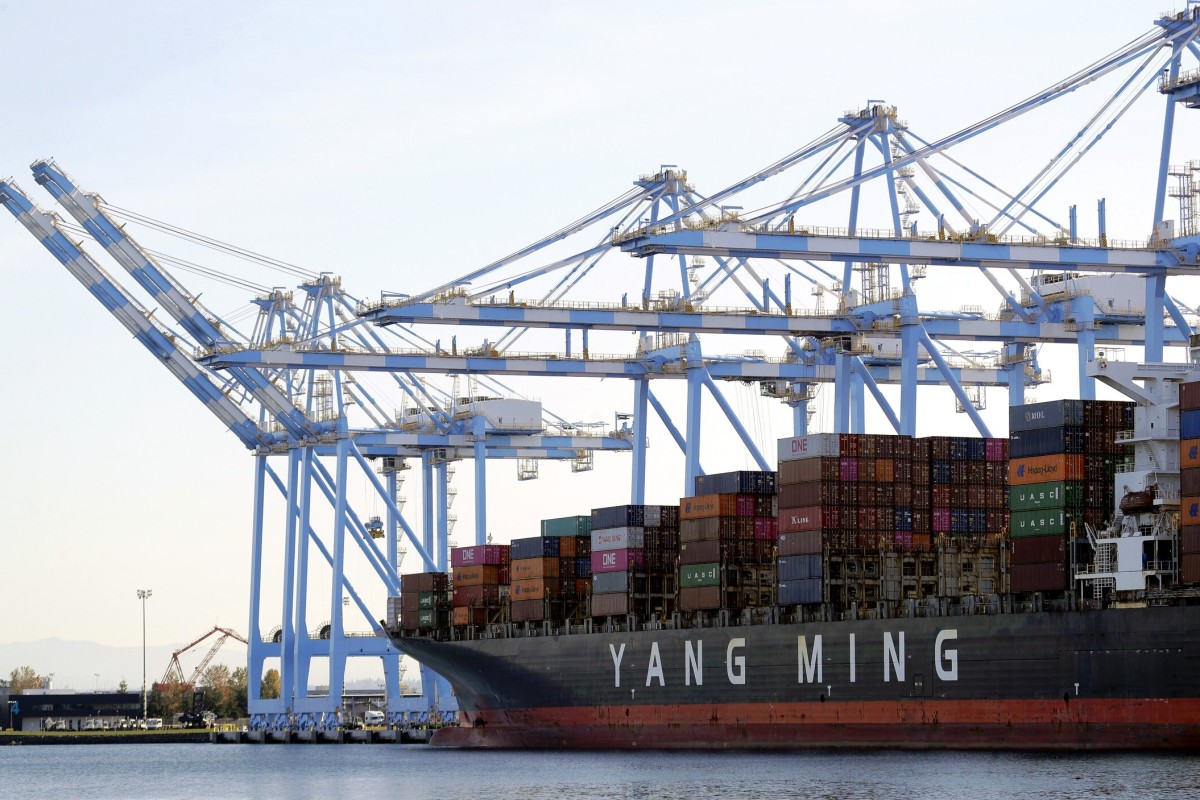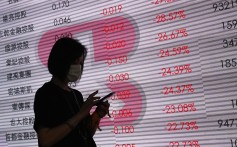US-China trade war slashes US$1.7 trillion from American companies’ market caps, Federal Reserve Bank of New York says
Higher tariffs are poised to reduce American firms’ investment growth rate by nearly 2 percentage points
Companies with exposure to China more affected as a slowdown in the Chinese economy reduces the return on investment American companies make there
Jodi Xu Klein in New York 29 May, 2020

Cargo cranes are used to take containers off of a Yang Ming Marine Transport boat at the Port of Tacoma in Washington last year. Photo: AP
The US trade war with China has slashed US$1.7 trillion from American companies’ market value, the Federal Reserve Bank of New York said in a Thursday report.
The higher tariffs, a tool to create a trade barrier against other countries, are poised to reduce American firms’ investment growth rate by nearly 2 percentage points.
The increased cost has already cut US investment expansion by 0.3 percentage points through the end of 2019 and will decrease by another 1.6 percentage points this year, according to the report published on Thursday by authors led by economist Mary Amiti, a vice-president at the Federal Reserve Bank of New York.
American firms bore almost all the cost of higher US import duties, and those that export to China also became less profitable due to Chinese tariffs, a finding that countered US President Donald Trump’s narrative that China is paying the tariffs.
The researchers, also including Columbia University’s Sang Hoon Kong and David Weinstein, used the comparison of stock prices to estimate lower expected profitability that in turn hurts future investment growth. The central bank’s research found that trade war announcements were associated with 8.9 per cent in stock price declines.
The study used the direct link between a firm’s market-to-book value and the firm’s investment outlays, a well-established correlation, to calculate growth, said Amiti in the research.
Factors that contribute to the reduction in future growth for American companies include greater policy uncertainty and changes in economic conditions due to the trade conflict.
Companies with exposure to China are more affected by the trade dispute as a slowdown in the Chinese economy reduced the return on investment that American companies made there, the researchers found.

“Discussions of the trade war often focus only on US exports to and imports from China, missing the much larger exposure of US firms emanating from their subsidiaries in China,” the report said.
About 46 per cent of 3,000 US companies included in this report are exposed to China through importing, exporting or selling through subsidiaries. They generated an average of 2.3 per cent in revenue from China.
The Trump administration started slapping new tariffs on more than US$300 billion of Chinese goods in 2018 in order to correct the widening trade deficit the US had with China.
Despite a phase one trade deal the two countries struck in January that put the drawn-on conflict on pause and prevented the latest batch of planned tariffs from going into effect, hundreds of billions of dollars in tariffs remain in place.
Trump and his senior advisers have insisted that China is paying the cost. But earlier research have shown that American companies and consumers are “paying almost the full cost of US tariffs”, according to a paper by the National Bureau of Economic Research published in January.
In November research by the Federal Reserve Bank of New York, the prices Chinese firms charged have barely budged, meaning the increased part of the cost was borne by US companies and consumers, estimated at around US$40 billion annually.

Jodi Xu Klein is an award-winning business journalist with 20 years of experience. She joined the Post in 2017, after a decade based in the US reporting for The Wall Street Journal and Bloomberg. She was part of the Time Magazine team that won the Henry R. Luce Award, breaking the China SARS story.
No comments:
Post a Comment